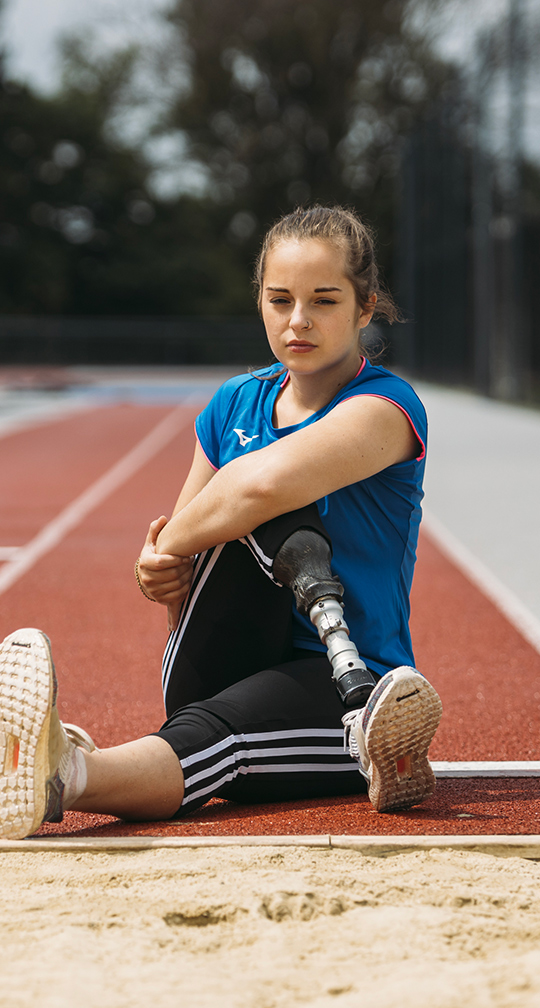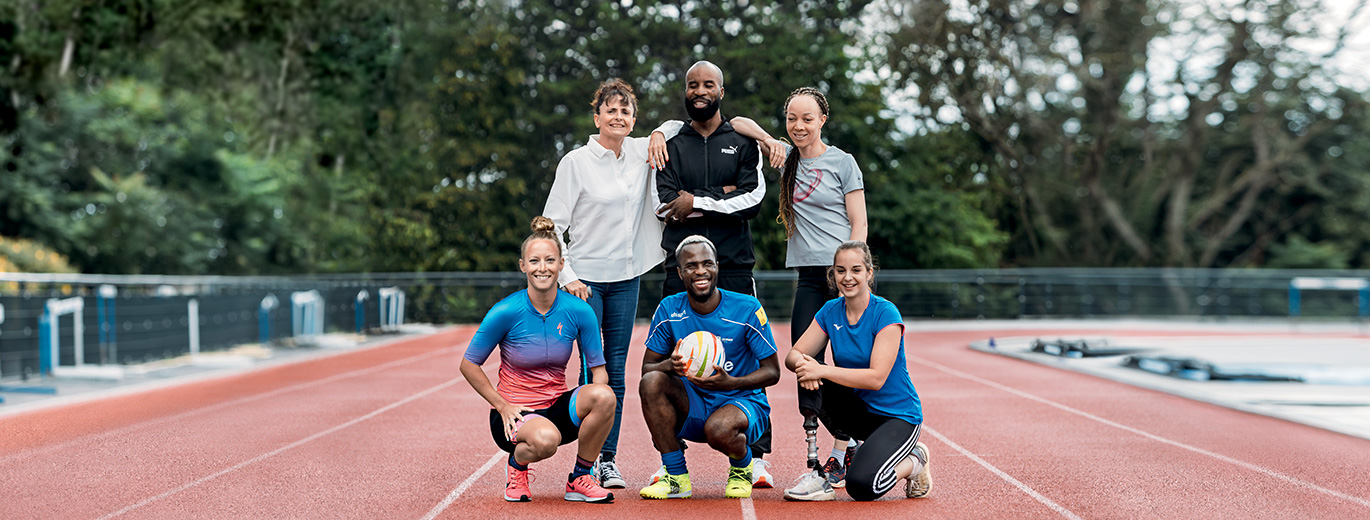
Disabilty : Bouygues in the starting blocks
Partnership
Bouygues SA and the five Business Segments have teamed up with six parasport athlete ambassadors and are pooling their resources to see that individuals with disabilities are fully included in the life of the Group. Now for a word from our champions…
By Céline de Buttet, Laura Franchet, Isabelle Godar et Grâce Noyal
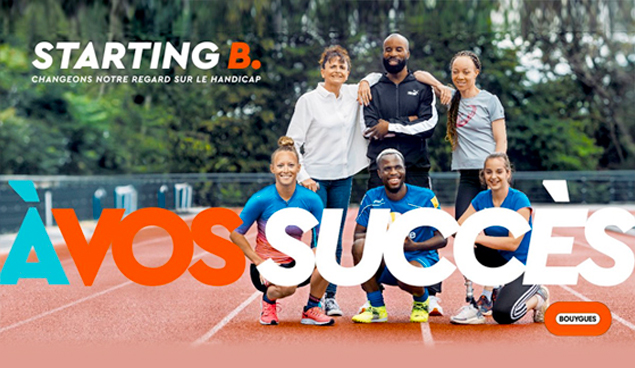
The Group’s five Business Segments have all had policies for disabled employees for several years. Now, to achieve new objectives, the Group has united these efforts in a new program called Starting B. (see sidebar opposite). Launched on 27 July 2021, this initiative provides a structure for carrying out disability-related actions in cooperation with six high-level Paralympic athletes: Nantenin Keita, Gwladys Lemoussu, Trésor Gautier Makunda, Typhaine Soldé, Claire Supiot, and Yvan Wouandji.
+1900
Employees with disabilities*
71
Recruitments of employees with a disibilty*
3,5
Million euros outsourced to sheltered employments organizations (ESAT) and adapted companies*
*Figures for the Groupe in France, 2020
“Through these athletes, the five Business Segments are able to speak about disability with one voice. Each Business Segment chose the athlete it wished to partner with for one year based on its culture, values, and objectives. The personalities and careers of these new parasport ambassadors exemplify the energy and ambition the Group is seeking to drive its disability policy.”
Deputy director for diversity at bouygues
Each of the Group’s entities provides the athletes with financial support to facilities itate their training or to purchase specific equipment; in return, the athletes give inspiration to other Group employees through events and talks aimed at increasing awareness and understanding of disabilities.
These activities are then communicated more widely on social networks. There are multiple objectives. These include increasing the number of disabled individuals hired, encouraging employees with special needs in their job to express them, and working more with companies in the protected sector. Everyone is hoping this initiative will continue for as long as possible, with sights set now on the Paris Paralympic Games in 2024.
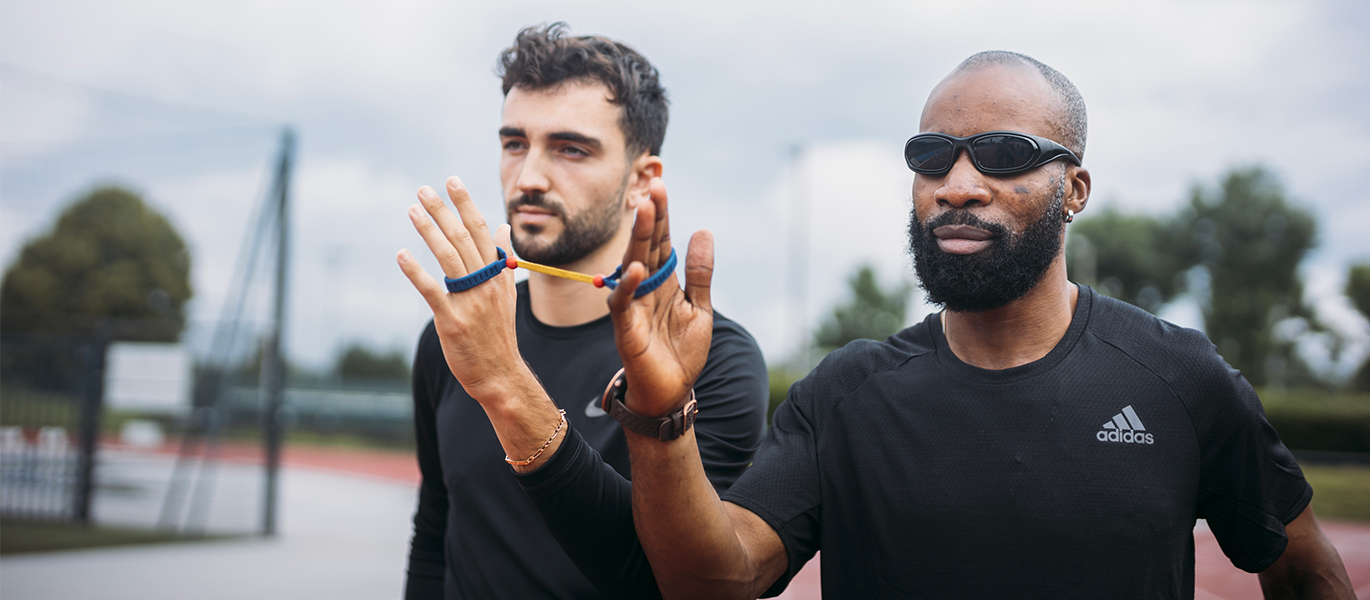
Change how others view disability
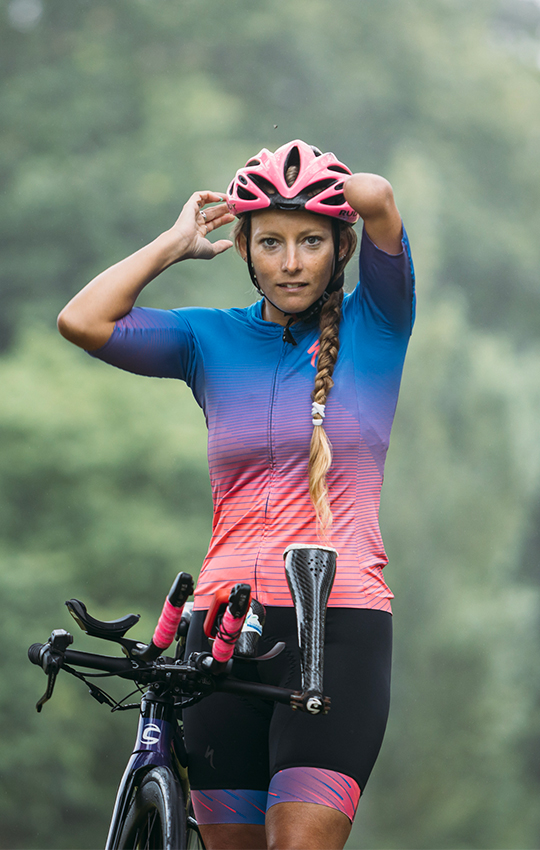
“I’ve had a disability since birth, but I’ve always considered myself normal. It’s how others view me that I would like to change. I’m missing an arm, some people have green eyes.”
In 2010, Gwladys took part with her swim club in the swimming event at the La Baule Triathlon. After racing in the same event a year later, she began competing at the international level in 2012. European and world parasport championships followed, one after the other, until in Rio, in 2016, Gwladys won a bronze medal, the first for France in the para-triathlon. That same year, she became a member of the Joiville Bataillon, a unit in the French Army made up of the athletes. Five years and numerous competitions later, the young woman form Saint-Jean-de-Monts, in southwestern France, took off for Tokyo. It was a tough meet, and she fought until the end. Disappointed with her performance, she nevertheless has wonderful memories of the week spent at the training camp at Mont Fuji to get acclimatized and prepare for the competition far from the hubbub of the Olympic Village. Since then, Gwladys, who is now in her thirties, has gone back to speaking in schools and companies, delighted to be able to talk about her sport and dispel the taboos around disabilities.
athlete sponsored by Colas. Triathlon.
on the heels of Carl Lewis
“Standing on the podium after the 400 meters at the London Paralympics in a packed stadium with my family and friends watching is still my best memory.”
Trésor dreamed of becoming a champion runner like his idol Carl Lewis. Born in Congo, he was diagnosed with a cataract at the age of three. “It was only when I arrived in France three years later that I gradually became aware of my disability.” Trésor managed to continue his schooling more or less normally and joined an athletics club in the Paris region at a time when the parasport sections did not yet exist. In 2004, he participated in an international competition for the first time, winning a silver medal at the Paralympics in Athens. Then came eleven more medals in 100-, 200-, and 400-meter races in official competitions.
“Standing on the podium after the 400 meters at the London Paralympics in a packed stadium with my family and friends watching is still my best memory.” Overcoming an injury, he turned in an outstanding performance at the Tokyo Paralympics, clocking the best time of his career. Meanwhile, Trésor supervises accessibility projects at SNCF, the French railways. “A person with a disability has a greater chance of finding himself or herself unemployed. I realize the luck I’ve had to be able to grow in my job and think about the future. My dream would be to end my athletic career at the age of 40 with a medal at the Paris Paralympic Games in 2024, with my wife and two children looking on.” His older child, who is six, took a photo of his father to school. He wants to be an athlete too, like his idol.
athlete sponsored by Bouygues Telecom. track and field.
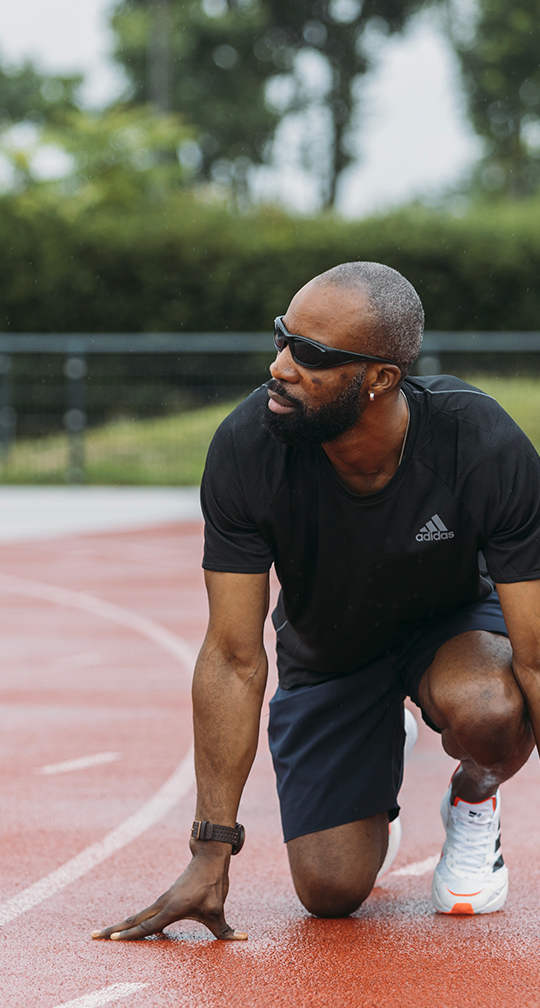
ending others’ fear of disability

“I can understand that employers might be reluctant to hire someone with a disability if they’ve never spent time with anybody who has one. That’s why it’s important that people come face to face with handicaps so that they are no longer afraid of them.”
Yvan Wouandji, 28, lost his sight at the age of ten due to a detached retina. He learned Braille at a special institute and then continued his education in an ordinary high school. Today, he is completing his master’s degree in journalism. Always fond of sports, after his accident he discovered blind soccer, wich is played on a small field, with five a side and an audible ball. The coach and goalkeeper are the only ones who can see, and they guide the players, who are blindfolded. “I get the same sensations with this sport as with ordinary soccer, except there is more interaction and more trust among the players.” Although the French team finished eight at the Tokyo Paralympics, Yvan will not soon forget the amazing goal he scored against the German side in 2015. It got a lot of media coverage and helped to raise the profil of blind soccer. Nowadays, Yvan regularly goes to companies, schools, and prisons to speak about the different experienced by disabled people ant to make disabilities seem more commonplace. He has also appeared in several news shows on TF1. “I can understand that employers might be reluctant to hire someone with a disability if they’ve never spent time with anybody who has one. That’s why it’s important that people come face to face with handicaps so that they are no longer afraid of them.”
athlète sponsored by TF1. blind soccer.
driven by desire to win
“I wanted to show that with my handicap I could do things just as welle as, if not better than, people who don’t have one.”
Thirty-six-year-old Nantenin Keita was born with a visual impairment and discovered sports in middle school. Always seeking to improve and come in first, she was spotted at the age of 15 by the Fédération française d’handisport and participated in her first international competition two years later. In 2006, she claimed the visually impaired world champion title in the 400 meters. “I wanted to show that with my handicap I could do things just as welle as, if not better than, people who don’t have one.” She considers the partnership with Bouygues an opportunity for mutual enrichment. “ We still have a lots to do, but I can raise awareness among a much larger public.” Her desire to win is also apparent in other commitments. Nantenin has taken over the foundation established by her father, Salif Keita, a popular Malian musician. Its mission is to improve the living conditions of albino children in Mali (she and her father are both albino) and to help young people with disabilities int Africa to become, through sport, full members of society. Her conviction: “The goal should be inclusion, not integration, so that everyone has the opportunity to experience life in the same way.”
athlète sponsored by Bouygues Construction. track and field.
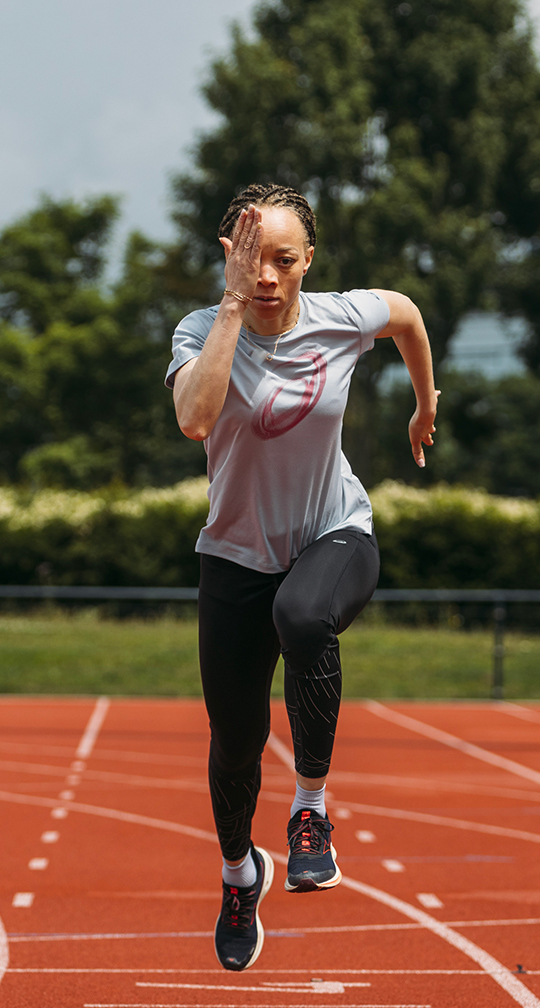
diving back in
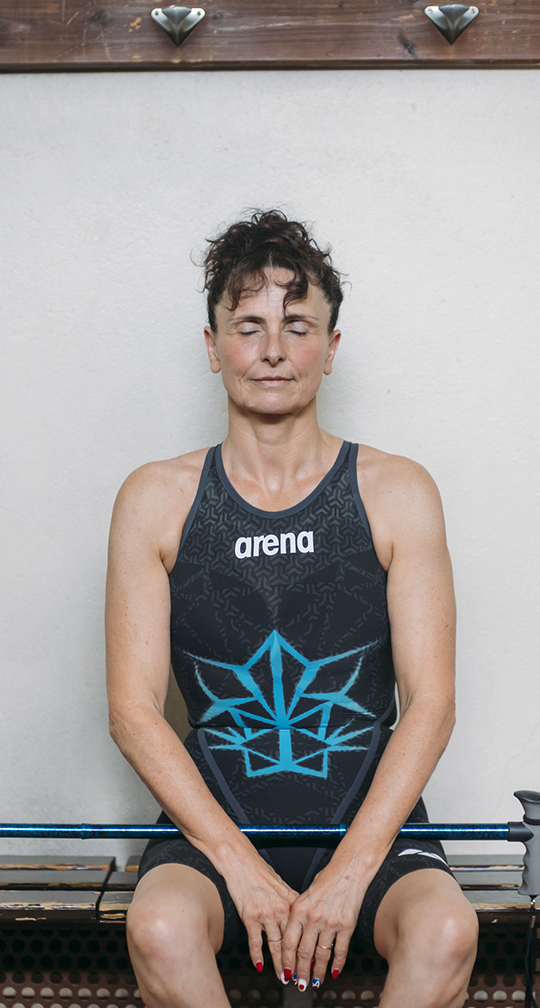
“It gave me enormous pleasure to compete in the final of the 100-meter butterfly. You must aim high and never stop believing.”
An Olympic and Paralympic athlete, mother of three grown children, a young grandmother… at 53, Claire has already lived a thousand lives. The story begins in sports classes in Dinard, where as a young girl Claire excelled at swimming. She joined the French national team and swam the 200-meter butterfly at the Seoul Olympic Games in 1988. She then abandoned the pools to take the time to raise her children. In 2009, she was diagnosed with Charcot-Marie-Tooth disease and began doing aquagym with a girlfriend. “My partner Frédéric asked me why I didn’t go back to swimming.” She accepted the challenge. With her brother Marc as trainer, she started working out and competing again after a 25-year pause. She thus became the Paralympics, doing so in the same sport. In early August, after giving her newly born granddaughter a goodbye hug, Claire was on her way to Japan, closing the Asian circle that began in Seoul. “It gave me enormous pleasure to compete in the final of the 100-meter butterfly. You must aim high and never stop believing.” On her return to Angers, where she is disability advisor for the département of Maine-et-Loire and a sponsor of the association Charcot-Marie-Tooth France, Claire headed back to the pool. Her goal? The 2024 Paris Olympics, of course.
athlète sponsored by Bouygues SA. swimming.
shatter the demeaning image of disability
“I totally accept my disabilities today. I don’t hide my artificial limb. On the contrary, I want to shatter the demeaning image of disabilities by showing that it’s possible to be happy.”
Nineteen years old and unshakable optimism. After having a leg amputated at the age of eleven as a result of foot cancer, Typhaine played handball, but she had trouble accepting her disability. Then, in 2017, she attended a day-long presentation of para-athletics by Marie-Amélie Le Fur, a parasport athlete and multiple Olympic medal winner who is also a leg amputee. Typhaine tried the long jump using a prosthetic leg designed for running and decided that would be her sport. “I was very eager to compete to prove that I could do what I had set out to do.” While studying psychology at Tours, she trained between two and four hours a day. Being selected for the Paralympic Games in Tokyo was a wonderful surprise for one of the youngest athletes on the French team. “When we arrived for the opening ceremony, the stadium was empty, but the atmosphere was still fantastic. And when I saw my name displayed on the screens in the stadium, I cried for joy!” Typhaine sees the partnership with Bouygues Immobilier as a way to give companies a better understanding of disabilities so that the subject is no longer taboo. “I totally accept my disabilities today. I don’t hide my artificial limb. On the contrary, I want to shatter the demeaning image of disabilities by showing that it’s possible to be happy.”
athlète sponsored by Bouygues Immobilier. track and field.
